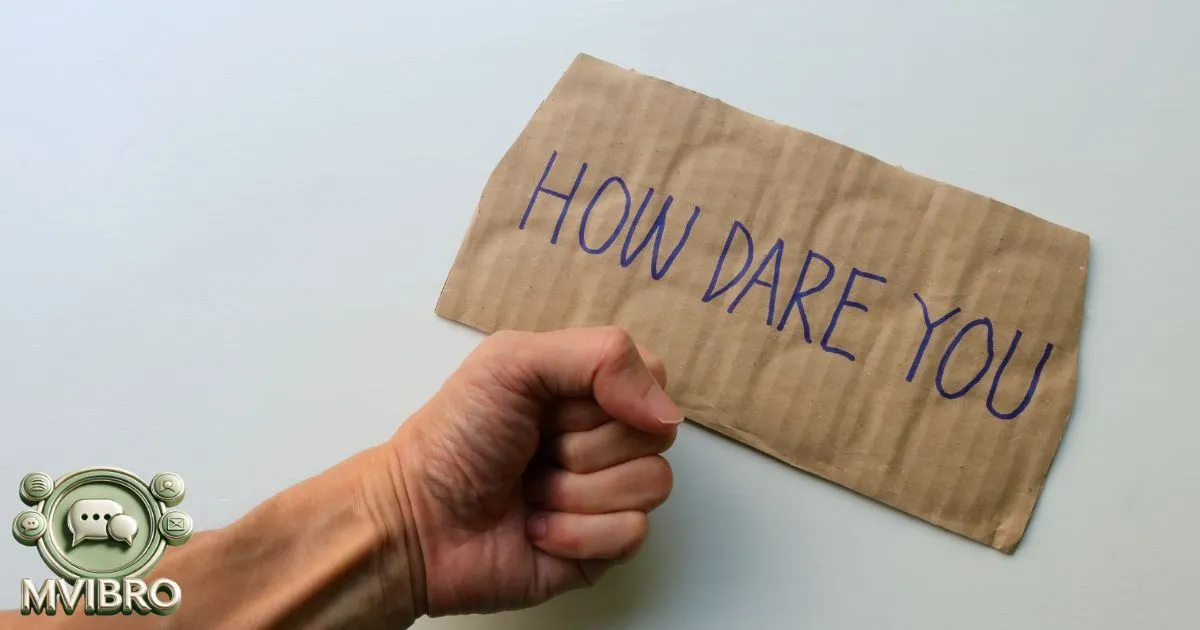“Responding to ‘How Dare You’ Remarks Professionally: Master the Art of Graceful Retorts”
When someone snaps at you with a “How dare you” remark, it’s easy to feel defensive, upset, or even angry. However, it’s crucial to remember that responding to these comments in a professional manner can save your reputation, maintain positive relationships, and prevent escalation.
In situations like these, your approach determines whether the conversation will end with respect or turn into a confrontation. Knowing how to handle such remarks calmly and confidently is a skill that will help you navigate both personal and professional interactions more effectively.
Next time someone confronts you with a “How dare you” comment, take a deep breath and pause. Instead of reacting impulsively, shift your mindset to stay composed. By responding thoughtfully, you can show your professionalism and defuse the situation. This blog will guide you through several strategies to handle such remarks in a way that promotes mutual respect and avoids unnecessary conflict.
Handling “How dare you” remarks requires a balance of assertiveness and empathy. Whether it’s in the workplace or your personal life, maintaining your dignity while responding effectively can turn a challenging situation into an opportunity for growth. In the following sections, you’ll find practical tips and professional strategies on how to manage these remarks with poise, keep the conversation respectful, and assert your boundaries without resorting to defensiveness.
List ofHandling “How Dare You” Remarks Professionally
- Sarcastic Comebacks
- Humorous Comebacks
- Sassy/Confident Comebacks
- Playful Comebacks
- Intellectual Comebacks
- Serious/Assertive Comebacks
- Empathetic Comebacks
- Playfully Deflecting Comebacks
- Philosophical Comebacks
- Cheeky/Fun Comebacks
- Mystical/Whimsical Comebacks
- Playfully Innocent Comebacks
- Surprised/Shocked Comebacks
- Self-Aware Comebacks
- Over-the-Top Dramatic Comebacks
- Politely Defiant Comebacks
- Clever Wordplay Comebacks
- Empowering Comebacks
- Rebellious Comebacks
- Emotionally Grounded Comebacks
Sarcastic Comebacks
- “Oh, my apologies, I didn’t realize I was speaking to royalty.”
- “I’ll add that to my list of things I never asked for.”
- “Oh, I didn’t know you were the gatekeeper of common sense.”
- “Is that your idea of a witty remark, or should I wait for the punchline?”
- “Well, that was an award-winning reaction!”
- “If sarcasm burned calories, we’d both be in great shape.”
- “Let me guess, you took a class in drama, didn’t you?”
- “Well, I’m glad I could be the highlight of your day.”
- “No need to thank me for my honesty, it’s what I do.”
- “Oh, please, I’d love to hear more of your emotional outburst.”
- “Guess I’ve become an expert in your emotional range.”
- “Wow, I didn’t realize I was triggering such high drama.”
- “My bad, I thought you were someone else for a moment.”
- “Is that a rhetorical question, or should I answer it?”
- “Ah, I see we’ve reached the sarcasm phase of this conversation.”
Humorous Comebacks
- “You’re right, I should have known better. But I’m still learning.”
- “I’ll just add that to my list of ‘Things to Not Do Again.’”
- “I didn’t know I was auditioning for a soap opera today.”
- “What an unexpected twist! I thought we were discussing something serious.”
- “And here I thought I was the one with the bad ideas!”
- “Is it too late to apologize for existing?”
- “Well, that was certainly a dramatic entrance.”
- “Next time, I’ll send a script before speaking to you.”
- “Oops, did I step into a reality show?”
- “I’ll try to keep my humor on a more acceptable level next time.”
- “You should seriously consider writing for a comedy show.”

- “I didn’t know I was stirring up a storm with that comment!”
- “If I had a dollar for every time someone said that to me…”
- “I’ll work on being less entertaining, just for you.”
- “Guess we’ve both earned an award for ‘Most Dramatic Conversation’ today.”
Sassy/Confident Comebacks
- “I don’t have regrets; I only do forward.”
- “If you think that’s bold, wait until you see my next move.”
- “I’ve got thick skin, so try harder.”
- “I speak the truth; it’s not my fault if it’s too real for some.”
- “I don’t apologize for being honest.”
- “Sorry, I didn’t realize your feelings were my responsibility.”
- “I’m not afraid of a little drama—bring it on!”
- “I didn’t expect you to agree with me, but that’s okay.”
- “If I’m stepping on toes, at least I’m going somewhere.”
- “My confidence is my superpower.”
- “I’m not here to please you, I’m here to be me.”
- “Keep your opinions to yourself, unless I ask for them.”
- “Not everyone will get my vibe, and that’s perfectly fine.”
- “If you can’t handle my honesty, that’s your problem, not mine.”
- “You’re welcome for the entertainment, but I’m done now.”
Playful Comebacks
- “Oops, I didn’t mean to make you blush.”
- “Is that your best shot? I’m still standing.”
- “Well, that was cute, but I’m moving on now.”
- “A little drama never hurt anyone, right?”
- “And they say I’m the one with a sharp tongue!”
- “Just kidding! Or am I?”
- “Did you just say that out loud? How adorable.”
- “You’ve got spunk, I’ll give you that!”
- “Oh, I see! You want a reaction. Nice try.”
- “Let’s pretend that didn’t happen, shall we?”
- “Careful, or you might make me laugh even harder!”
- “I’m not mad, just slightly entertained by your reaction.”
- “Oh, you’re not as scary as you think!”
- “Try me, I dare you!”
- “It’s all fun and games until someone’s feelings get hurt—oops!”
How to Respond to Instagram Comments Professionally
Intellectual Comebacks
- “That’s an interesting perspective, but I think you’re missing the bigger picture.”
- “Let’s discuss that in detail, I’m open to different viewpoints.”
- “I’d love to hear your reasoning behind that opinion.”
- “I think we’re overlooking the deeper issue here.”
- “That’s an argument with a few holes in it, let’s break it down.”
- “I can see where you’re coming from, but let me challenge that idea.”
- “A valid point, but let me offer a different perspective.”
- “That’s one way to look at it, but have you considered this angle?”
- “It’s fascinating how often people miss the nuances in such matters.”
- “I’m afraid your logic doesn’t hold up under scrutiny.”
- “I think we need to address the fundamentals before jumping to conclusions.”
- “Let’s slow down and analyze the facts first.”
- “That’s a great starting point, but let’s dive deeper.”
- “You’ve raised an interesting question, let’s unpack it.”
- “I think the data would suggest otherwise.”
Serious/Assertive Comebacks
- “I’m entitled to my opinion, just as you are to yours.”
- “Let’s focus on the issue, not personal attacks.”
- “That’s not a productive way to communicate. Let’s try again.”
- “I don’t appreciate being spoken to like that, let’s remain respectful.”
- “I hear you, but I disagree, and here’s why.”
- “That’s not an acceptable way to address me.”
- “Let’s keep this conversation respectful and professional.”
- “I understand your frustration, but let’s address the facts.”
- “You’re welcome to express your opinion, but I won’t tolerate rudeness.”
- “I expect to be treated with respect, and I’ll offer the same in return.”
- “This conversation isn’t going anywhere with that tone.”
- “Let’s focus on solutions, not personal grievances.”
- “I respect your viewpoint, but I must stick to mine.”
- “We can disagree without disrespecting each other.”
- “I think we’re getting off track—let’s stay on point.”
Empathetic Comebacks
- “I can see that you’re upset, let’s try to talk this through.”
- “I understand why you might feel that way, but let’s find a solution.”
- “It’s clear that this situation has bothered you, let’s resolve it together.”
- “I hear your frustration, and I want to help fix the issue.”
- “I understand your concerns, but I think there’s been a misunderstanding.”
- “I can appreciate why you’re upset, but let’s address the core issue.”
- “I know this isn’t easy, but let’s work through it calmly.”
- “It seems like we’re both a little heated, but let’s try to find common ground.”
- “I can sense that this is frustrating for you, but I’d like to understand better.”
- “It’s not my intention to upset you; can we talk about this more openly?”
- “I get why you’d be angry, but let’s focus on resolving this instead.”
- “I hear you, and I want to make sure we address your concerns.”
- “I can understand where you’re coming from, but let’s find a way forward.”
- “I know this situation is tough, and I’m here to listen if you need to vent.”
- “I understand you’re frustrated, but we need to remain constructive in our discussion.”
Playfully Deflecting Comebacks
- “Oh, did I just hit a nerve? My bad!”
- “I’m just here for the drama—let’s keep it moving!”
- “It’s just a conversation, not a confrontation!”
- “I wasn’t expecting this kind of intensity today!”
- “If only I could take a break from all this excitement!”
- “I see we’re having a ‘How to be dramatic’ moment!”
- “Alright, I’ll tone it down—don’t want to overwhelm you!”
- “Let’s take a breath and remember—this isn’t life or death!”
- “Whoa, someone woke up on the fiery side today!”
- “Alright, alright! No need to get so worked up!”
- “I was just testing your reaction, and you nailed it!”
- “Okay, I get it! That was a slightly over-the-top comment.”
- “I promise, I’m not trying to steal the spotlight.”
- “Let’s save the heavy emotions for the movies!”
- “Did I say something to spark a mini crisis?”
Philosophical Comebacks
- “Sometimes, we learn the most when we least expect it.”
- “The truth is rarely what we want it to be.”
- “Maybe it’s not about what’s said, but how we perceive it.”
- “Every disagreement is an opportunity for growth, don’t you think?”
- “The greatest minds were once criticized for their bold thoughts.”
- “We often misunderstand each other more than we realize.”
- “What if this isn’t about you or me, but a deeper question we’re both missing?”
- “In the grand scheme of things, our differences are small.”
- “Perhaps, it’s our egos that make the simplest things complicated.”
- “Isn’t it fascinating how every perspective is subjective?”
- “Maybe the real question isn’t what was said, but how we choose to respond.”
- “What if everything we’re arguing about is just a matter of timing?”
- “Perhaps this moment will pass, and we’ll see it differently later.”
- “The greatest challenges often lead to the most profound insights.”
- “In the end, it’s not about being right—it’s about understanding.”
Cheeky/Fun Comebacks
- “That’s one way to start a conversation!”
- “Oh, you want drama? I’ve got a whole season ready for you!”
- “Let me know when you’re ready to bring the popcorn!”
- “I didn’t know I was dealing with the emotionally complex today!”
- “Guess I’m your new favorite person to pick on!”
- “I’m just here for gossip, nothing personal!”
- “Well, I wasn’t expecting this intensity—what happened to small talk?”
- “You’re a tough crowd, but I like it!”
- “Oops, did I stir the pot again? My bad!”
- “And that’s how you turn a conversation into a theatrical performance!”
- “Okay, okay, I’m backing off—didn’t mean to cause a scene!”
- “I think you’re getting the wrong idea—let’s clear that up!”
- “Alright, time to dial it down before you get too dramatic!”
- “You’ll have to work harder than that to get me rattled!”
- “And that’s how you win the ‘Best Reaction’ award!”
Mystical/Whimsical Comebacks
- “The universe works in mysterious ways, my friend.”
- “I’ve seen things you wouldn’t believe, but this—this is new.”
- “Perhaps this is just part of your journey, a lesson in disguise.”
- “Only the stars know what really happened here.”
- “I’m just a messenger of the cosmos; don’t shoot the messenger!”
- “I’m sure the moon has a good laugh every time I speak.”

- “Life is a dream—maybe this is just a really odd chapter.”
- “I’ll consult the magic eight ball—give me a second!”
- “A little sprinkle of stardust is what we all need, I think.”
- “Maybe this is just a cosmic misunderstanding we’ll laugh about later.”
- “I’ve heard stranger things from talking trees in the forest.”
- “The wind whispers secrets, and I think I’ve heard one about you!”
- “This could be the work of mischievous fairies, I wouldn’t doubt it.”
- “We’re all just actors in a play written by destiny itself.”
- “Who’s to say this moment wasn’t destined to happen under the full moon?”
Playfully Innocent Comebacks
- “Oh, I didn’t mean to upset you! Was I too much?”
- “I didn’t know that was such a big deal! I’m sorry!”
- “Wait, did I just say something wrong? I was just joking!”
- “Oops, didn’t mean to stir things up. I’ll be more careful!”
- “I didn’t realize you were so sensitive about it. My bad!”
- “I was just being silly, no harm intended!”
- “I didn’t think you’d take that seriously. Oops!”
- “Sorry if I was too blunt—just trying to make you smile!”
- “I’m really not trying to be dramatic, I swear!”
- “Oh no, did I mess up? I was just playing around!”
- “I didn’t think you’d mind—I’ll be more thoughtful next time!”
- “It was just a joke, I didn’t mean to offend you!”
- “I promise, I wasn’t trying to be annoying!”
- “I didn’t realize my comment would cause such a reaction—sorry!”
- “Whoops, I didn’t mean to cause a stir, I was just being cheeky!”
Surprised/Shocked Comebacks
- “Wow, I didn’t see that coming!”
- “Well, that’s a new way to approach this conversation!”
- “I can’t believe you just said that. I’m speechless!”
- “Hold on, what did you just say? That was unexpected!”
- “That’s one way to keep me on my toes!”
- “I honestly didn’t think you were going to go there!”
- “Okay, now you’ve really surprised me!”
- “Well, this conversation just took an interesting turn!”
- “You’ve definitely caught me off guard with that one!”
- “I didn’t think that would be your response, but here we are!”
- “You’ve really thrown me for a loop with that remark!”
- “That’s a bold move, I wasn’t expecting that!”
- “Wow, you really went there! I didn’t see that coming!”
- “Well, you’ve shocked me into silence with that comment!”
- “I’m not sure how to respond to that, I’m genuinely surprised!”
Self-Aware Comebacks
- “Yeah, I tend to speak before I think sometimes—my bad!”
- “I’m aware that I can be a bit blunt, but I mean no harm.”
- “I get it, sometimes I can be a little too much.”
- “I admit, I have a knack for saying the wrong thing at the wrong time!”
- “I’ve been told I can be a bit sarcastic—guilty as charged!”
- “I can be a bit intense, but I’m working on it!”
- “I know, I tend to get carried away with my thoughts!”
- “I’ll try to dial down the drama next time!”
- “I’m not always the best communicator, but I try!”
- “You’re right, I have a tendency to speak my mind, even when I shouldn’t.”
- “I’m learning to think before I speak, but it’s a work in progress!”
- “I realize I can be a little too upfront, but I mean well!”
- “I admit it, I can be a bit too enthusiastic sometimes!”
- “Sometimes my sense of humor doesn’t land well, but I’ll keep trying!”
- “I can be a little unpredictable, but that’s just part of who I am!”
Over-the-Top Dramatic Comebacks
- “How dare you? You’ve shattered my heart into a thousand pieces!”
- “I can’t believe you just said that, I’m overcome with emotion!”
- “This is the worst betrayal I’ve ever experienced!”
- “I am absolutely floored by your words!”
- “You’ve just triggered a series of emotional explosions within me!”
- “Oh, the drama! My heart cannot handle this!”
- “I’m on the verge of tears—how could you say such a thing?”
- “I’m emotionally wrecked, and it’s all because of you!”
- “You’ve left me speechless, in the most dramatic way possible!”
- “This is the kind of conversation that will haunt me forever!”
- “I never thought I’d hear such harsh words, my soul is in agony!”
- “You’ve just created an emotional whirlwind within me!”
- “I’m dramatic, yes, but this just takes the cake!”
- “This is the emotional rollercoaster of the year!”
- “I am now going to faint from the emotional toll of this conversation!”
Politely Defiant Comebacks
- “I understand your point, but I have to respectfully disagree.”
- “I appreciate your opinion, but I stand by what I said.”
- “That’s an interesting perspective, but here’s where I see it differently.”
- “I hear you, but I think I’m entitled to my own view.”
- “I respect your thoughts, but I think I’ve made my position clear.”
- “I understand your concerns, but my decision remains unchanged.”
- “Thanks for sharing, but I’m going to stick with my approach.”
- “I see where you’re coming from, but I’ll have to disagree.”
- “That’s one way to look at it, but I’m comfortable with my stance.”
- “I appreciate your input, though I’ll stand firm on this.”
- “I get your point, but my opinion won’t change.”
- “I see your perspective, but I’ll choose to see things my way.”
- “Thank you for your thoughts, but my decision is final.”
- “I respect your viewpoint, but I don’t agree with it.”
- “I’m going to have to politely disagree, if you don’t mind.”
Clever Wordplay Comebacks
- “I didn’t mean to ‘tackle’ your point, but I just had to add that.”
- “I guess I’ll have to ‘counter’ that argument with my own thoughts.”
- “Looks like I’ve ‘figured’ this one out faster than I thought!”
- “Well, that’s a bit of a ‘pun-ishing’ remark, don’t you think?”
- “That’s a clever way to ‘turn the tables,’ but I’m not fooled.”
- “You’re throwing me a ‘curveball,’ but I’m ready for it.”
- “If I had a ‘penny’ for every time I’ve heard that, I’d be rich!”
- “I guess you’ve ‘wrapped’ that up pretty nicely, but here’s my twist.”
- “I could’ve sworn you were about to ‘break the ice,’ but that’s not quite what happened!”
- “I see what you did there, but I’ll ‘play’ my own game.”
- “That’s an interesting ‘twist’ on things, but I think I’m ahead.”
- “You’re quite the ‘wordsmith,’ but I’m no slouch either.”
- “You’ve ‘sparked’ my interest, but I’ve got my own perspective to offer.”
- “That was a ‘sharp’ comment, but I’m still ready to take the lead.”
- “I didn’t expect that ‘turn of phrase,’ but I’ll raise you one!”
Empowering Comebacks
- “I’m secure in who I am, and your opinion doesn’t change that.”
- “I don’t need anyone’s validation to know my worth.”
- “I choose to rise above and stay focused on what matters.”
- “Your words don’t have the power to affect my confidence.”
- “I am unapologetically myself, and that’s enough.”
- “I have no doubt in my abilities, and I’m going to prove it.”
- “I believe in my path, and nothing can stop me from walking it.”
- “I’m strong enough to take on anything, including your criticism.”
- “I’m confident in my decisions, and I trust my judgment.”
- “I don’t let negativity from others define my worth.”
- “My self-worth is not up for debate—thanks for the input, though.”
- “I’m proud of who I am, and that’s all I need to know.”
- “Your doubts don’t define me; my confidence does.”
- “I know what I’m capable of, and I’m not afraid to show it.”
- “I am my own source of strength, and no one can take that from me.”
Rebellious Comebacks
- “Who says I have to conform? I’m happy just as I am.”
- “I don’t follow rules just because they’re there, I create my own path.”
- “If being different means standing out, then I’ll wear it proudly.”
- “You can’t box me in—I live on my own terms.”
- “I’m not afraid to break away from the norm; it’s called freedom.”
- “I march to the beat of my own drum, thanks for noticing.”
- “Rebellion is in my DNA, and I wouldn’t have it any other way.”
- “I don’t do well with limits, so I’ve learned to break them.”
- “If that’s how it’s supposed to be, I’ll go ahead and do the opposite.”
- “The rules weren’t made for people like me, and I like it that way.”

- “I’m not one to follow the crowd, I prefer to lead it.”
- “I’m not afraid of rocking the boat—let’s see what happens!”
- “I don’t need to be like everyone else; being myself is enough.”
- “Why fit in when you were born to stand out?”
- “I don’t do ‘average,’ I do ‘extraordinary.’”
Emotionally Grounded Comebacks
- “I understand your frustration, but let’s keep this conversation respectful.”
- “I see where you’re coming from, but let’s talk it through calmly.”
- “I’m going to stay grounded and respond with understanding, not emotion.”
- “Let’s address this with clarity and not let emotions cloud the issue.”
- “I hear your concerns, and I’m open to hearing more.”
- “I understand that this is important to you, and I want to discuss it calmly.”
- “I won’t let my emotions take over in this conversation.”
- “I’m here to listen and respond with respect, not emotion.”
- “I’m confident we can resolve this logically and peacefully.”
- “I hear you, but let’s work through this with a clear mind.”
- “Let’s remain calm and focused, and address this issue logically.”
- “I appreciate your perspective, and I’d like to address it thoughtfully.”
- “This conversation is important, and I want to approach it with composure.”
- “I’ll stay level-headed, as always, and we can figure this out together.”
- “Let’s stay grounded and move forward with mutual understanding.”
What Does “How Dare You” Mean?
When someone says “How dare you”, it’s a powerful expression of shock, anger, or disapproval. This phrase is typically used when someone feels deeply offended or betrayed by another person’s actions or words. It implies that the person being addressed has crossed a boundary, acted disrespectfully, or done something unexpected and upsetting.
The tone of “How dare you” often suggests that the speaker believes the other person has no right to act in the way they have. It’s a demand for accountability, with the speaker questioning the audacity of the other’s actions or behavior. The phrase carries a weight of moral judgment, as if to say, “How could you do this?”
Why “How Dare You” Stings So Much
The phrase “How dare you” stings because it attacks our sense of self-worth and our understanding of social boundaries. When said to us, it implies that we’ve done something fundamentally wrong, and in many cases, it can feel like a moral accusation or personal judgment.
When we hear it, our immediate reaction might be to feel small or guilty, even if we didn’t intend to offend. The phrase cuts deep because it challenges our intentions and self-perception. It places us in a defensive position, where we must justify our actions.
Situations Where You Might Hear “How Dare You”
- Personal Relationships:
In personal relationships, “How dare you” often arises when trust is broken, or one person feels deeply hurt by the other’s actions. For example, if a partner lies or betrays confidence, the other may exclaim this phrase as a response to the perceived betrayal.
- Professional Settings:
In professional settings, hearing “How dare you” could stem from someone feeling disrespected in the workplace. Perhaps a colleague oversteps boundaries or makes an inappropriate remark, leading to this sharp outburst.
- Social Interactions:
In social situations, “How dare you” can be triggered by rude behavior or when someone feels insulted or disrespected. Whether it’s a joke that goes too far or an unwelcome comment, this expression often indicates that personal boundaries have been crossed.
Immediate Emotional Reactions to “How Dare You”
- Anger:
Hearing “How dare you” can trigger an immediate feeling of anger. You might feel unfairly accused or misunderstood, leading to a defensive or reactive response. This anger may be directed toward the speaker, yourself, or the situation.
- Guilt:
In contrast, some might experience guilt upon hearing the phrase, especially if they unintentionally hurt the other person. The phrase can make you second-guess your actions and feel responsible for the emotional impact on the other party.
- Confusion:
Sometimes, confusion arises because you’re unsure why the speaker reacted so strongly. This might happen if you didn’t realize your behavior was offensive, leaving you trying to figure out what went wrong.
How to Stay Calm When You Hear “How Dare You”
- Take a Deep Breath:
The first step to staying calm is to take a deep breath. It helps you center yourself and resist the immediate urge to respond defensively. It’s a simple but effective way to clear your mind before reacting.
- Pause Before Speaking:
Pausing before speaking gives you a moment to process your emotions and thoughts. It can help you avoid saying something you might regret in the heat of the moment. This pause also gives the other person a moment to collect themselves.
- Count to Three:
If you’re struggling to stay calm, try counting to three in your head. This brief mental exercise allows you to create a buffer between the emotional trigger and your response, enabling a more measured reaction.
The Importance of Understanding the Speaker’s Intent
Understanding the speaker’s intent is crucial in these situations. They may not always mean to attack you personally but might be reacting out of frustration, hurt, or a misunderstanding. By trying to see where they’re coming from, you can better address their feelings without escalating the conflict.
This approach helps de-escalate the situation, as it allows you to respond with empathy rather than defensiveness. It may also reveal that their reaction is more about their emotional state than your actions.
How to Respond Gracefully: A Step-by-Step Guide

- Take a Deep Breath:
Before responding, take a deep breath to collect your thoughts and emotions. This helps ensure that your response is calm and thoughtful.
- Ask for Clarification:
Politely ask for clarification if you’re unsure about what triggered the response. This opens up the conversation for a deeper understanding and shows that you’re willing to engage in a dialogue.
- Acknowledge Their Feelings:
Acknowledge the other person’s feelings without dismissing them. You might say, “I understand why you might feel upset.” This helps to validate their emotions and shows empathy.
- Explain Your Side Calmly:
After acknowledging their feelings, calmly explain your side of the situation. Be clear, concise, and non-defensive. Avoid getting caught up in justifying every action, and instead focus on the bigger picture.
Should You Apologize When You Hear “How Dare You”?
Whether or not you should apologize depends on the context and whether you believe you’ve genuinely done something wrong. If you recognize that your actions have hurt the other person, offering a sincere apology can help to diffuse tension. However, if the reaction feels disproportionate or unwarranted, you might choose to simply explain your actions without apologizing.
Ultimately, the decision to apologize should come from a place of authenticity, not from a sense of obligation.
Handling Aggressive or Hostile Responses
When faced with aggressive or hostile responses, it’s important to remain calm and not match the aggression. Responding with patience, diplomacy, and empathy helps to defuse the situation. You can also establish boundaries by stating that you’re willing to continue the conversation once it becomes more respectful.
Turning the Situation Into a Positive Conversation
Turning a “How dare you” moment into a positive conversation involves actively listening, validating emotions, and offering a solution or compromise. By staying open and engaged, you can transform a negative exchange into an opportunity for growth and understanding.
What NOT to Do When You Hear “How Dare You”
- Don’t Get Defensive:
The last thing you want to do when someone says “How dare you” is to become defensive. This only escalates the situation and prevents productive communication.
- Avoid Sarcasm or Mocking Tones:
Sarcasm or mocking tones can make the situation worse. It may come across as dismissive and undermine any efforts to resolve the conflict.
- Don’t Shut Down the Conversation:
Shutting down the conversation by walking away or refusing to engage will only prolong the issue. It’s better to stay calm and keep the dialogue going.
How to Maintain Your Confidence During the Conversation
To maintain your confidence, stay grounded in your beliefs and values. Speak calmly and assertively, making sure that your responses are thoughtful and well-considered. This helps you stay in control of the situation and prevents emotional reactions from taking over.
What If You’re the One Saying “How Dare You”?
If you find yourself saying “How dare you,” it may be an indication that you’re reacting emotionally to something that has deeply upset you. Before you speak, take a moment to reflect on why you’re feeling this way. Try to express your feelings calmly and respectfully, focusing on the specific behavior rather than attacking the person.
Conclusion
In conclusion, responding to “How dare you” remarks professionally is all about maintaining your calm, asserting your boundaries, and communicating effectively. By staying poised, you not only defuse potential tension but also gain respect for handling the situation with grace.
Remember, professionalism in the face of criticism speaks volumes about your character. The next time you’re confronted with such remarks, take control of the conversation and handle it with confidence.
Key Insight
Why do people say “How dare you”?
People often say this when they feel shocked, offended, or disrespected. It’s their way of expressing disbelief or indignation at your actions or words.
How can I respond to a “How dare you” comment without escalating the situation?
Respond calmly by acknowledging the emotion behind their statement, and politely ask for clarification. This shows respect and defuses the tension.
Should I defend myself immediately when someone says “How dare you”?
No, it’s best to remain calm first. Take a moment to assess the situation and then respond with professionalism and respect.
Can “How dare you” remarks be constructive?
Sometimes, these remarks are a reaction to a misunderstanding or perceived disrespect. By addressing the underlying issue thoughtfully, they can lead to a productive conversation.
How do I prevent “How dare you” remarks in the future?
Practice active listening, remain respectful, and ensure open communication to prevent misunderstandings that may trigger these kinds of remarks.

Hi! I’m Lauren Reynolds, a proud voice at mvibro.com, delivering quick, impactful responses and creative comebacks to elevate your communication game.

